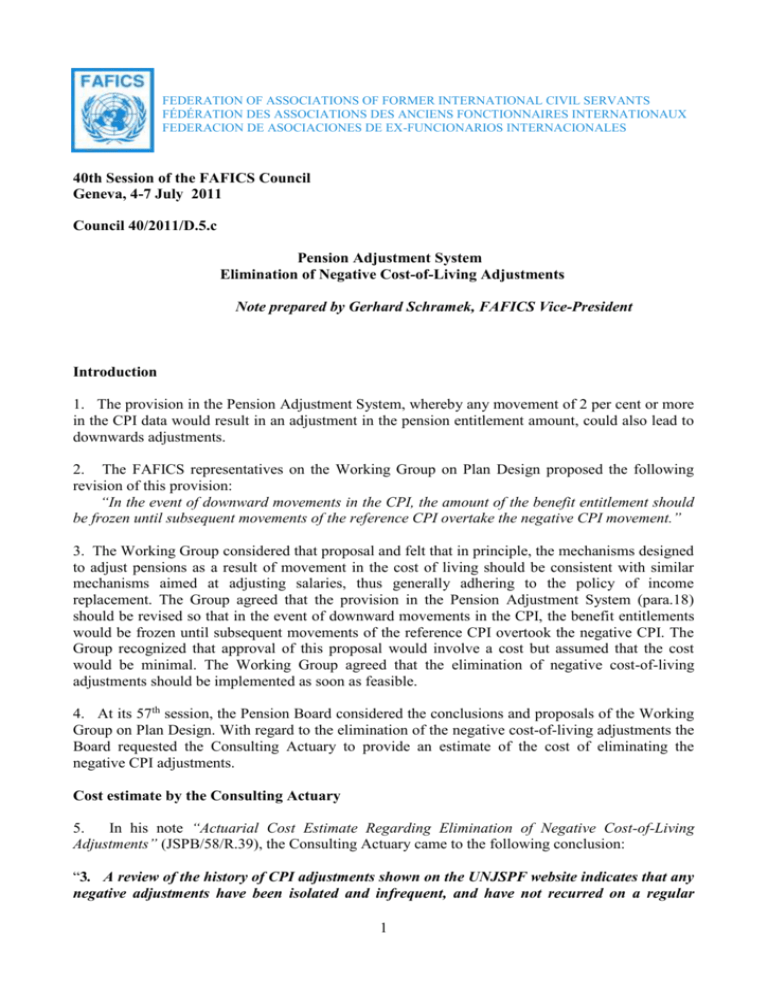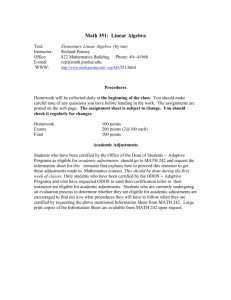DOC - AAFI-AFICS, Geneva
advertisement

FEDERATION OF ASSOCIATIONS OF FORMER INTERNATIONAL CIVIL SERVANTS FÉDÉRATION DES ASSOCIATIONS DES ANCIENS FONCTIONNAIRES INTERNATIONAUX FEDERACION DE ASOCIACIONES DE EX-FUNCIONARIOS INTERNACIONALES 40th Session of the FAFICS Council Geneva, 4-7 July 2011 Council 40/2011/D.5.c Pension Adjustment System Elimination of Negative Cost-of-Living Adjustments Note prepared by Gerhard Schramek, FAFICS Vice-President Introduction 1. The provision in the Pension Adjustment System, whereby any movement of 2 per cent or more in the CPI data would result in an adjustment in the pension entitlement amount, could also lead to downwards adjustments. 2. The FAFICS representatives on the Working Group on Plan Design proposed the following revision of this provision: “In the event of downward movements in the CPI, the amount of the benefit entitlement should be frozen until subsequent movements of the reference CPI overtake the negative CPI movement.” 3. The Working Group considered that proposal and felt that in principle, the mechanisms designed to adjust pensions as a result of movement in the cost of living should be consistent with similar mechanisms aimed at adjusting salaries, thus generally adhering to the policy of income replacement. The Group agreed that the provision in the Pension Adjustment System (para.18) should be revised so that in the event of downward movements in the CPI, the benefit entitlements would be frozen until subsequent movements of the reference CPI overtook the negative CPI. The Group recognized that approval of this proposal would involve a cost but assumed that the cost would be minimal. The Working Group agreed that the elimination of negative cost-of-living adjustments should be implemented as soon as feasible. 4. At its 57th session, the Pension Board considered the conclusions and proposals of the Working Group on Plan Design. With regard to the elimination of the negative cost-of-living adjustments the Board requested the Consulting Actuary to provide an estimate of the cost of eliminating the negative CPI adjustments. Cost estimate by the Consulting Actuary 5. In his note “Actuarial Cost Estimate Regarding Elimination of Negative Cost-of-Living Adjustments” (JSPB/58/R.39), the Consulting Actuary came to the following conclusion: “3. A review of the history of CPI adjustments shown on the UNJSPF website indicates that any negative adjustments have been isolated and infrequent, and have not recurred on a regular 1 basis. Therefore, based on the history of actual negative adjustments, it would appear that the cost eliminating the negative cost-of-living adjustments would be minimal. 4. However, the negative adjustment mechanism provides for automatic hedge against the extreme tail risk of a global economic crisis that is deflationary in nature when the Fund’s assets would have suffered substantial investment losses. For that reason, revision of this assets would have suffered substantial investment losses. For that reason, revision of this provision could significantly increase the Fund’s risk in the event of such an extreme crisis.” Consideration of the Committee of Actuaries 6. At its 58th session the Committee of Actuaries considered the above-mentioned note by the Consulting Actuary on the effect of eliminating negative cost-of-living adjustments. After discussion the Committee concluded: “the Committee agreed with the Consulting Actuary’s comments regarding the fact that the elimination of negative cost-of-living adjustments, while adding a minimal cost to the Fund, could create a significant financial risk to the Fund in extreme economic situations where multiple countries could experience deflationary periods at the same time Fund investments could correspondingly be negatively affected. Therefore, the Committee recommended to the Board that no change to the current regulations be made on this matter.” Consideration 7. It should be noted that the conclusions of the Consulting Actuary as well as the Committee of Actuaries’ recommendation to the Board not to approve the elimination of negative cost-of-living adjustments are not based on actuarial data, but on a possible scenario of a global economic crisis “where multiple countries could experience deflationary periods at the same time Fund investments could correspondingly be negatively affected”. 8. Although no such extreme economic situation, i.e. periods of deflation in multiple countries, occurred in the past decades, we are currently going through a severe financial crisis which also had a negative effect on the Fund’s investment. As a result, the actuarial valuation by 31 December 2009 showed an actuarial deficit of 0.38 per cent of Pensionable Remuneration. Furthermore, the actuarial valuation by 31 December 2011 could well show an actuarial deficit once again. 9. In light of this financial climate and considering that the Board normally follows the recommendations of the Committee of Actuaries, it seems unlikely that the Board will approve the elimination of negative cost-of-living adjustments. 10. The Council might wish to reflect on the foregoing considerations with a view to providing guidance to the FAFICS delegation to the Pension Board. 20 June 2011 2







